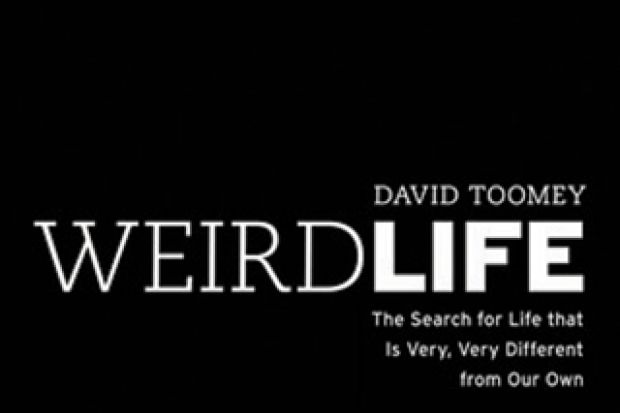Nature itself”, David Toomey says, “will outperform the uniformed imagination every time”, and Weird Life is his attempt at convincing us. It does a grand job of introducing a few of the weirdest life forms on Earth, as well as defining what we mean by life in the first place and how it may have got started here, as well as where we might expect to find extraterrestrial bacterial life in our solar system.
Toomey is not a scientist but the head of a technical and professional writing programme at the University of Massachusetts in Amherst, and his journalistic prowess is certainly evident here. One of this book’s beautiful turns of phrase is a description of microbial cells coming together to cooperate: “achieving survival more by snuggle than struggle”.
However, I can’t help but feel that Weird Life falls short of the scope promised in the quote above. The meat of its actual science, and by that I mean things that have in fact been discovered and are currently being studied by scientists, rather than discussion of various hypotheses or postulations on what may be possible, is crammed into the first chapter. Here, Toomey takes a safari among organisms tolerating the most hostile and extreme environmental conditions on Earth - the so-called extremophiles, and the subject of some of my own research. He is an engaging tour guide as he whizzes past the bizarre-looking tubeworms huddled round hydrothermal vents in the pitch black of the ocean floor, bacteria swarming in water hot enough to boil an egg or in battery-acid- strength volcanic fluids, and the salt-loving bugs that make the Dead Sea a 30-mile-long misnomer.
But he misses a trick. The most intriguing thing about extremophiles is not simply that they survive physical or chemical conditions once assumed to be intolerably hostile but how they do it. How are they fundamentally different from our own cells? What is special in their cellular make-up that bestows upon them such incredible survival skills and what does that teach us about the workings of life? Much of this fascinating story of our understanding of weird life on Earth is skipped over, as Toomey races on to more fantastic possibilities.
We hear some scientists speculate that there may be life forms on our planet that are native - with their biochemical origins right alongside our own - but are nonetheless alien to us - that is, built in a fundamentally different way, perhaps by using a molecule other than DNA to store their vital information. Toomey considers even more extreme alternatives: life 100,000 billion years in the future, wallowing in the still-warm atmospheres of white dwarfs, or perhaps creatures perched on the lip of a black hole and sipping at the energy frothing out by quantum effects.
My problem is that such imaginings satisfy only the very lowest level of significance - they are not known to be impossible - but are by no means well established or even have any good reason to be thought probable. I think readers would expect a dessert course of this sort of discussion in such a book but not at the expense of a far more thorough, and ultimately satisfying, root around known extraordinary biology.
This isn’t a bad book and I enjoyed being carried along with the story; it just misses the crucial balancing point between exploring the fascinating reality of the weirdest forms of life sharing our home world and the far less edifying (and largely unconstrained) parlour game of speculating on what may perhaps be possible somewhere out there.
Weird Life: The Search for Life that is Very, Very Different From Our Own
By David Toomey
W. W. Norton, 288pp, £16.99
ISBN 9780393071580
Published 26 March 2013
Register to continue
Why register?
- Registration is free and only takes a moment
- Once registered, you can read 3 articles a month
- Sign up for our newsletter
Subscribe
Or subscribe for unlimited access to:
- Unlimited access to news, views, insights & reviews
- Digital editions
- Digital access to THE’s university and college rankings analysis
Already registered or a current subscriber?




